Through a generous gift from Oriel MacLennan, a life-long enthusiast of the history of science, the History of Science and Technology Program established the MacLennan Lecture in April 2017.
The MacLennan Lecture funds a visiting scholar to present a public lecture in the field of Science and Technology Studies or in History and Philosophy of Science. King’s students, as well as interested senior students in the local secondary schools are also invited to spend time with the visiting lecturer in a seminar setting.
Coming up
8th MacLennan Lecture
The Tissue of the World: The Nature of Ancient Sympathy
Presented by Princeton Classicist, Dr. Brooke Holmes presents the 8th MacLennan Lecture
March 11, 2026, 7 p.m. ADT
Dr. Brooke Holmes is Susan Dod Brown Professor of Classics and Director of the Gauss Seminars in Criticism at Princeton University
7th MacLennan Lecture
What If? Alternative Pasts for Science and Technology — and Why They Matter
Presented by Greg Radick, Professor of History and Philosophy of Science, March 6, 2025
Asking about the pasts that might have happened but didn’t happen comes naturally to us, as much in our individual lives (what if I hadn’t seen that car coming?) as in our collective ones (what if Churchill hadn’t been the British leader during WWII?). But can such questions be answered well? A suspicion that they can’t be—and therefore that “counterfactual history,” as it’s known, is a waste of time—runs deep in the historical profession. For the history of science and technology, that suspicion is if anything stronger, thanks to a long tradition of supposing that, when the time is ripe for a discovery or invention, it becomes inevitable, so that the scientific and technological present was bound to look like it actually does. In this lecture Gregory Radick will argue on the contrary that finding out about the possibilities of the past rightly falls under the historian’s job description; that historians of science and technology are in an especially good position to do so in an evidence-based way; and that their making the effort can yield benefits for the present well beyond improved historical understanding.
6th MacLennan Lecture
Harry Benjamin, hormones, and the early history of transgender healthcare
Presented by writer and historian, Alison Li on March 12, 2024
Today’s gender-affirming care has roots that date back over a century. Harry Benjamin (1885-1986) was the author of the ground-breaking 1966 book The Transsexual Phenomenon and a pivotal figure in the early history of transgender medicine. The German-American physician was one of the first medical professionals to provide a detailed clinical discussion of transgender identity and argue for compassionate treatment. Curiously, he came to this work only late in life, after a long career in geriatrics. His enthusiasm for the therapeutic potential of hormones was the thread connecting the disparate parts of his professional life. In this presentation, Alison Li examines the early development of transgender healthcare in the context of the emergence of hormonal medicine. The science of endocrinology not only provided tools for medical gender transition but a striking vision of the body as malleable.
Photo by: Diana Renelli
5th MacLennan Lecture
A Psychedelic Resurgence: Lessons from the Past
Presented by Dr. Erika Dyck on November 17th, 2022
Psychedelics have resurfaced in the 21st century. The American FDA declared both MDMA (Ecstasy) and psilocybin mushrooms to have breakthrough status for their capacity to outperform their pharmaceutical competitors in clinical trials. Health Canada has allowed for select uses of psychedelics, while Alberta has boldly supported psychedelics in therapy beginning in 2023. Researchers and journalists alike claim that we are experiencing a psychedelic renaissance. In this presentation Dyck will examine the historical roots of this moment, from Ancient and Indigenous uses of plants for healing and spiritual purposes, through the medical experimentation of the 1950s and the countercultural embrace of psychedelics that some argue resulted in their prohibition. Dyck asks, what has changed to warrant a retrial and what is at stake in this resurgence?
Canadian Research Chair and Saskatoon-based historian, author and VP of the Alcohol and Drug History Society, Erika Dyck has been at the epicenter of conversations bridging science, medicine, Indigenous knowledge, drug policy, commerce, and ethics surrounding psychedelics. For 20 years she has watched psychedelics move from an earlier heyday of research and a cultural fascination with drugs like LSD, mushrooms and peyote that led to strict global prohibitions. Only underground labs and protected Indigenous ceremonies persisted. But now, psychedelics are part of mainstream conversations about their capacity to overhaul a mental health crisis, and Erika is at the forefront of these discussions.
4th MacLennan Lecture
Rameau’s Nemesis: Music, Nature, and Society in the Writings of Rousseau
Presented by Dr. Brandon Konoval on March 24, 2021
How did music contribute to the philosophical and critical projects of Jean-Jacques Rousseau (1712–1778)? As composer, professional copyist, and critic, Rousseau’s passionate preoccupation with music throughout his life inspired numerous texts, from his early proposal for a more ‘democratic’ system of music notation, through the Lettre sur la musique françoise, articles on music for the Encylopédie and for his own Dictionnaire de musique, and his polemical exchanges with the leading contemporary French composer and theorist, Jean-Philippe Rameau (1683–1764). These writings highlight key concerns raised in the two Discourses, along with the Essai sur l’origine des langues that originated with the Discours sur l’inégalité, revealing an intimate relationship between Rousseau’s interest in the origins and evolution of music, and in the origins of, and prospects for, civil society. Animating these accounts was Rousseau’s conception of nature and the natural (Konoval 2017), a critical concern that framed Enlightenment debates over the relationship between natural order and social order, and between art—especially music—and science.
3rd MacLennan Lecture
Decolonizing (≠ Reconciling): Science, Technology, and Indigenous Relations
Presented by Dr. Kim TallBear on January 30, 2020
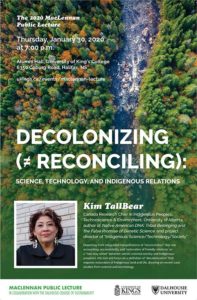 The MacLennan lecture was presented in Collaboration with the Dalhousie College of Sustainability by Dr. Kim TallBear on January 30, 2020 at 7 p.m. in Alumni Hall, University of King’s College.
The MacLennan lecture was presented in Collaboration with the Dalhousie College of Sustainability by Dr. Kim TallBear on January 30, 2020 at 7 p.m. in Alumni Hall, University of King’s College.
Dr. Kim TallBear is the Canada Research Chair in Indigenous Peoples, Technoscience & Environment, University of Alberta, author of Native DNA, and project director of “Indigenous: Science/Technology/Society”.
This talk departs from misguided interpretations of “reconciliation” that see accounting, accountability, and “restoration of friendly relations” as a two-way street, between settler-colonial society and Indigenous people(s). However, it is the settler-colonial power structure that is responsible for restoration of good relations, land, and “resources”—both human and more-than-human—that were cut from Indigenous communities and which disrupted Indigenous lives and lifeways. Focusing on a definition “decolonization” that requires the restoration of Indigenous land and life (Tuck and Yang 2012), this talk examines the role of science and technology via several case studies in restoring good relations, resources, and governance capacity to Indigenous nations and communities.
2nd MacLennan Lecture
Stanley’s Dream: The Canadian Medical Expedition to Easter Island
Presented by Jacalyn Duffin, January 16, 2019
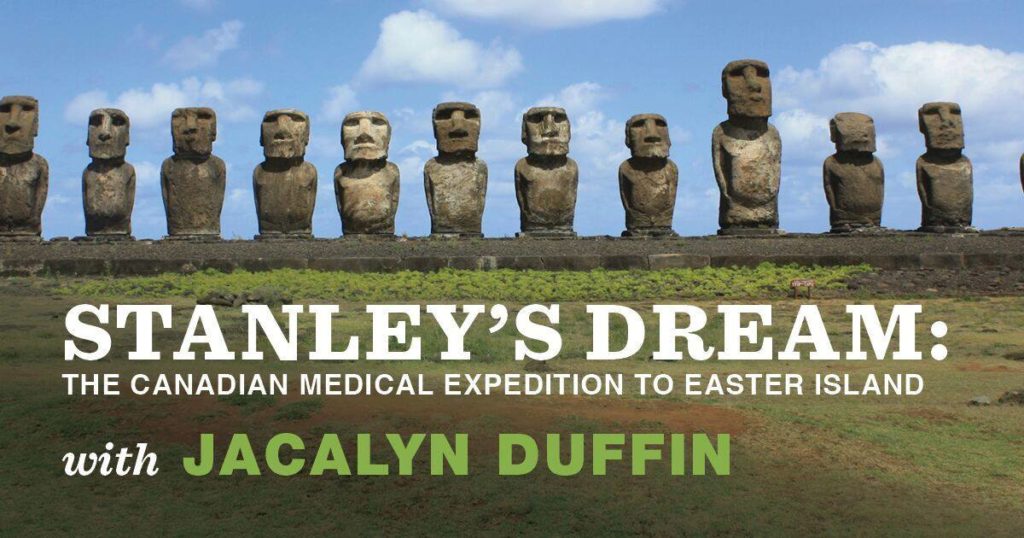
Dr. Jacalyn Duffin, hematologist and historian at Queen’s University, presented the 2nd MacLennan lecture in the History of Science and Technology. Dr. Duffin will spoke on her new book project Stanley’s Dream: The Canadian Medical Expedition to Easter Island.
In 1964, an international scientific team, led by McGill gastroenterologist Stanley Skoryna, convinced Prime Minister Lester Pearson to donate a navy vessel to a plan to document the biosphere of the word’s most remote community: Easter Island. Emerging in a climate of international cooperation, METEI became one of Canada’s contributions to the International Biological Program It was predicated on the imminent prospect of an airport to link this sheltered island with humans, animals, plants, and microbes everywhere else. With World Health Organization support, the scientists would characterize all life forms in terms of genus and species, but also in terms of genetics, physiology, metabolism, and immunology. It would be complete only when repeated decades later–an exercise that never took place.
Few historians have examined this adventure. With special focus on its medical aspects, this paper focuses on its scientific justifications and products through the publications and personal papers of researchers and the ship’s captain, held in archives in Ottawa, Vancouver and Montreal. This evidence is amplified by interviews with surviving scientist-travellers from Canada, US, Sweden, and South Africa.
The team journeyed from Halifax via Panama, transporting scientific apparatus and supplies, including portable buildings for a laboratory compound. Over three months, they documented the size, lung capacity, blood groups, and immune status of the 1000 human inhabitants. They also tried to characterize all the plants, animals, and microbes. They were captivated by the romance of the island’s past–the mysterious moai statues and the disappearance of its dense forest—features popularized by the famous Kon Tiki expedition of Norwegian Thor Heyerdahl in 1947. Aware that their presence might transmit infection, they volunteered medical services. The team returned in February 1965 to analyze mountains of data, leaving behind one doctor and the buildings to serve as a clinic.
Skoryna boasted 100 percent success, but his opinion was quietly contested; relationships were strained, publications few, and several surprise findings limited the impact. Furthermore, in light of postmodern sensitivities, uncomfortable racist overtones underlie the plan. Nevertheless two unexpected and previously unrecognized benefits, concerning polio and cancer chemotherapy, continue to exert influence even now.
1st MacLennan Lecture
Science and the Rationality of the Social
Presented by Dr. Sundar Sarukkai. October 25, 2017
The national discourse of science in India has been premised on the claim that science has a capacity to make people think and behave ‘rationally’. This association is so strong that the Constitution of India lists ‘scientific temper’ as one of the constitutional duties of an Indian citizen. The belief that something called a scientific temper can remove ‘blind beliefs’ and ‘superstitions’ continues to resonate even in contemporary rhetoric of scientists. Similar claims appear in the public domain on climate change and creationist debates in other countries. The claims about this capacity of science are based on certain assumptions about science and its presumed opposition to religion, rituals, authority and tradition. Are we asking too much of science in expecting it to do this task of creating a ‘rational’ public? Can scientists themselves bear this burden? In this talk, I will explore whether, and how, the rationalities of particular kinds of practices of science (or other humanistic disciplines) can impact the beliefs and actions of the larger society.
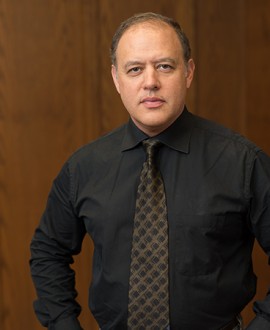 Dr. Brandon Konoval holds a cross-appointment as Associate Professor with the UBC Arts One Program and the UBC School of Music. His research in intellectual and cultural history engages with the history of moral and political thought, the history and philosophy of science and technology, and music studies in several domains, with particular attention to the relationship between music and early modern science.
Dr. Brandon Konoval holds a cross-appointment as Associate Professor with the UBC Arts One Program and the UBC School of Music. His research in intellectual and cultural history engages with the history of moral and political thought, the history and philosophy of science and technology, and music studies in several domains, with particular attention to the relationship between music and early modern science.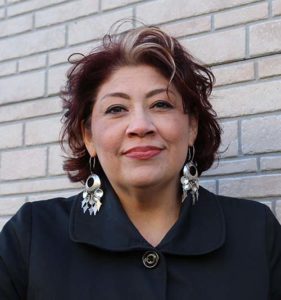
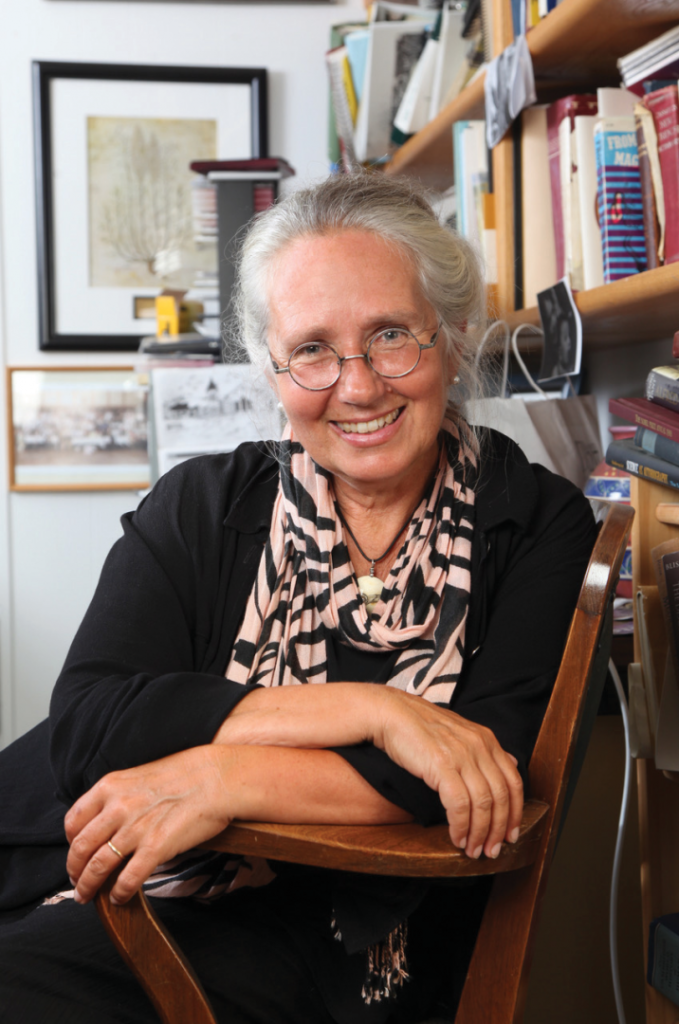 Dr. Jacalyn Duffin, MD, PhD, is a hematologist and historian who has occupied the Hannah Chair of the History of Medicine at Queen’s University since 1988. A former president of both the American Association for the History of Medicine and the Canadian Society for the History of Medicine, she is the author of eight books and many articles, holds several awards for teaching and research, and is a Fellow of the Royal Society of Canada and the Canadian Academy of Health Sciences. Her research focuses on disease, technology, religion, and health policy.
Dr. Jacalyn Duffin, MD, PhD, is a hematologist and historian who has occupied the Hannah Chair of the History of Medicine at Queen’s University since 1988. A former president of both the American Association for the History of Medicine and the Canadian Society for the History of Medicine, she is the author of eight books and many articles, holds several awards for teaching and research, and is a Fellow of the Royal Society of Canada and the Canadian Academy of Health Sciences. Her research focuses on disease, technology, religion, and health policy.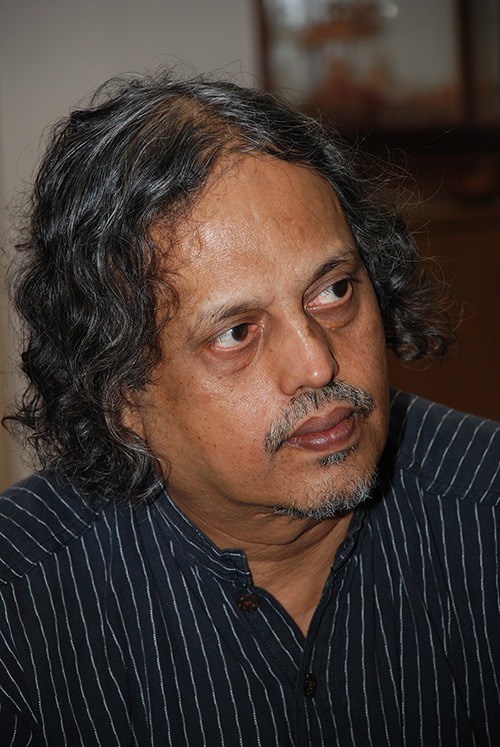 Dr. Sundar Sarukkai is a Professor of Philosophy at the National Institute of Advanced Studies, Indian Institute of Science Campus in Bangalore. He came to King’s as the History of Science and Technology Programme Visiting Scholar-in-Residence for the Fall of 2017.
Dr. Sundar Sarukkai is a Professor of Philosophy at the National Institute of Advanced Studies, Indian Institute of Science Campus in Bangalore. He came to King’s as the History of Science and Technology Programme Visiting Scholar-in-Residence for the Fall of 2017.